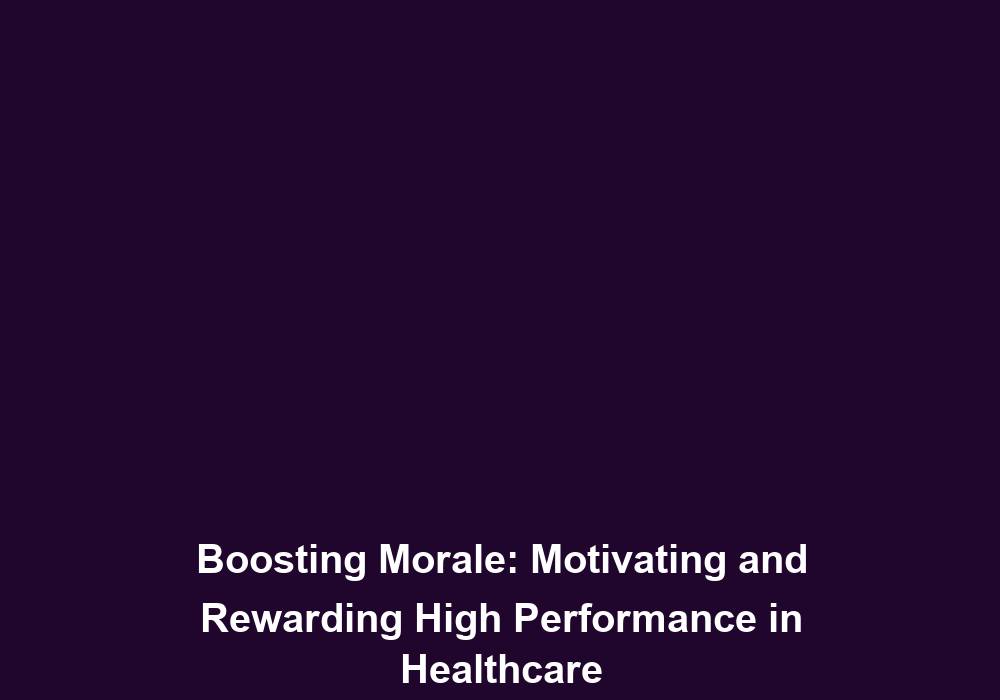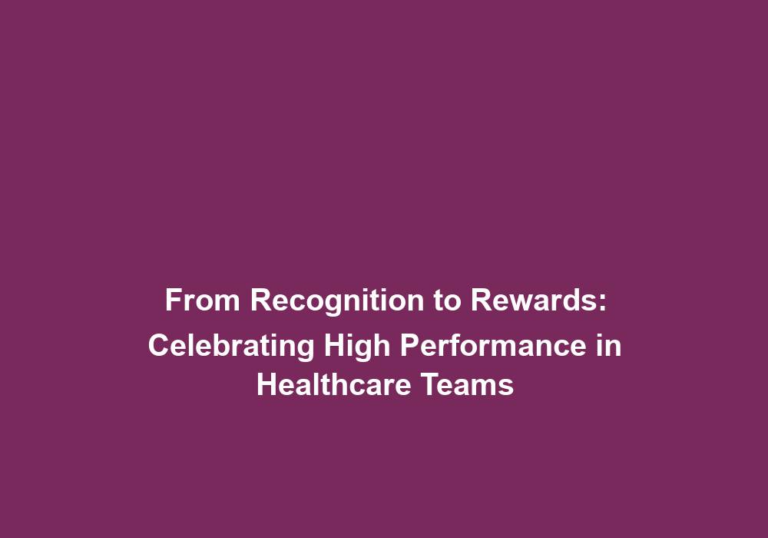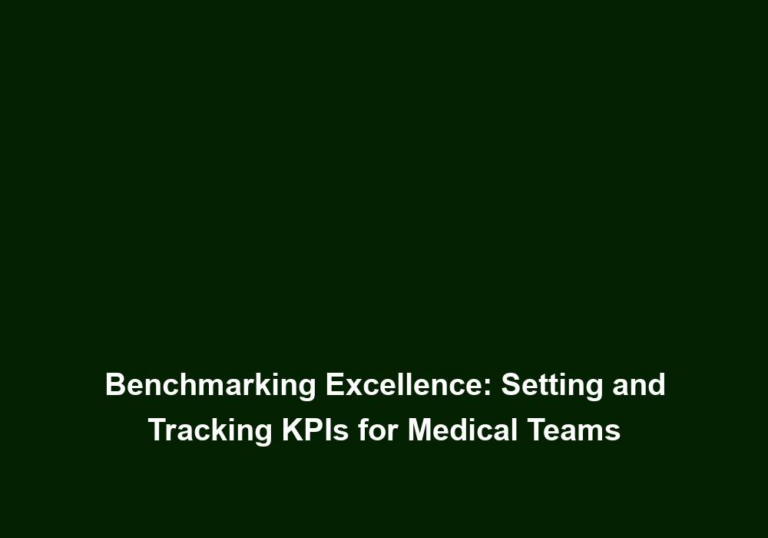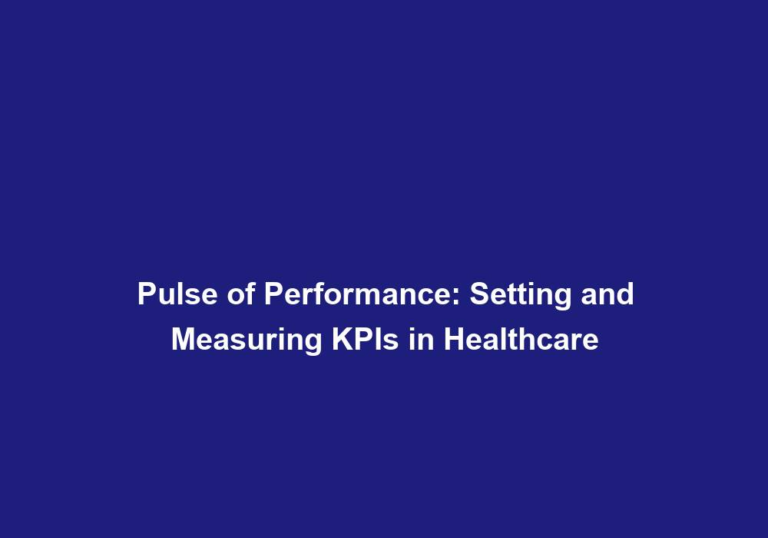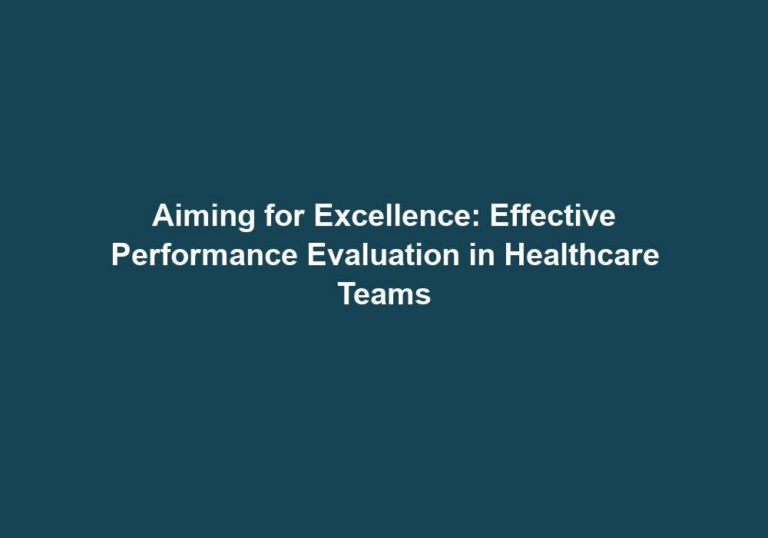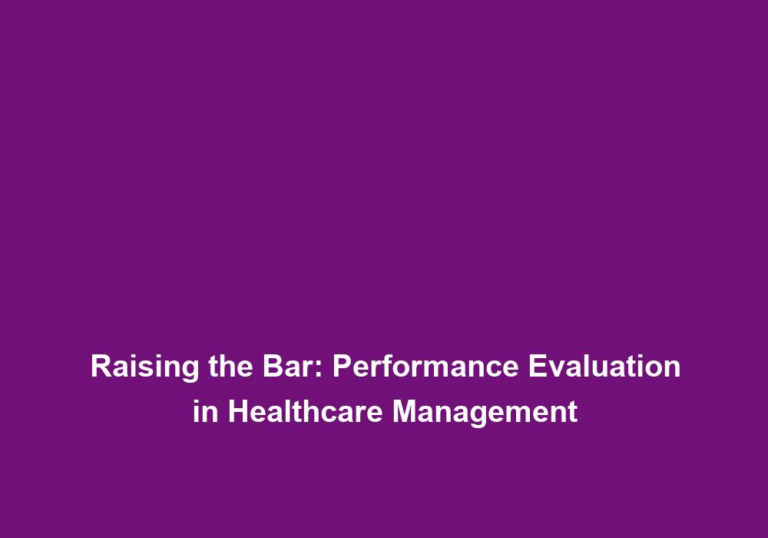Boosting Morale: Motivating and Rewarding High Performance in Healthcare
In the fast-paced and demanding field of healthcare, it is crucial to have a motivated and high-performing workforce. Not only does a positive work environment enhance patient care and outcomes, but it also improves employee satisfaction and retention. As a SEO content writing expert, I understand the importance of addressing this topic comprehensively. In this article, I will explore various strategies and techniques to boost morale, motivate, and reward high performance in the healthcare industry.
1. Understanding the Importance of Morale in Healthcare
1.1 The Impact of Morale on Patient Care
Maintaining high morale among healthcare professionals is directly linked to the quality of patient care. When employees are motivated and satisfied, they are more likely to provide compassionate, efficient, and effective care. Studies have shown that positive morale leads to improved patient satisfaction, reduced medical errors, and better overall health outcomes.
Positive morale creates a sense of purpose and dedication among healthcare professionals. It inspires them to go above and beyond their responsibilities, resulting in a higher quality of care. When healthcare workers feel motivated and satisfied, they are more likely to show empathy towards patients, actively listen to their concerns, and provide personalized care tailored to individual needs. This compassionate approach not only improves patient satisfaction but also contributes to better health outcomes.
1.2 The Consequences of Low Morale
Conversely, low morale can have detrimental effects on both the individual and the organization. Healthcare workers experiencing low morale may exhibit decreased productivity, increased absenteeism, and higher turnover rates. These consequences can negatively impact patient care, team dynamics, and the reputation of the healthcare institution.
Low morale can lead to a lack of engagement and motivation among healthcare professionals. When employees are demotivated, they may become disengaged from their work, leading to decreased productivity and an increased likelihood of errors. This can compromise patient safety and overall quality of care. Additionally, low morale can contribute to increased absenteeism, as employees may feel less compelled to come to work or may experience stress-related health issues. High turnover rates resulting from low morale can disrupt team dynamics, decrease continuity of care, and damage the reputation of the healthcare institution.
2. Strategies for Boosting Morale
2.1 Effective Communication Channels
Establishing clear and open communication channels is essential for fostering a positive work environment. Regular team meetings, one-on-one sessions, and feedback mechanisms enable healthcare professionals to voice their concerns, ideas, and suggestions. Moreover, leaders should actively listen and respond to their employees, ensuring that their perspectives are valued and considered.
In addition to regular communication, it is important to create a culture of transparency and trust within the healthcare organization. This can be achieved by openly sharing information about organizational goals, changes, and challenges. By keeping employees informed and involved in decision-making processes, they feel valued and engaged. Effective communication channels also provide an opportunity for healthcare professionals to receive constructive feedback on their performance and identify areas for improvement.
2.2 Training and Professional Development Opportunities
Investing in training and professional development not only enhances the knowledge and skills of healthcare professionals but also demonstrates the organization’s commitment to their growth. By offering continuous learning opportunities, such as workshops, conferences, and online courses, healthcare institutions empower their employees to stay updated with the latest advancements in their field. This, in turn, boosts morale by instilling a sense of competence and professional satisfaction.
Training and professional development opportunities help healthcare professionals stay abreast of advancements in their field and enhance their expertise. By investing in their growth, organizations show that they value their employees’ professional development. This can lead to increased job satisfaction and motivation among healthcare professionals. Additionally, ongoing training and development can provide healthcare professionals with the necessary tools and knowledge to deliver high-quality care, resulting in improved patient outcomes.
2.3 Recognition and Appreciation
Recognizing and appreciating the hard work and dedication of healthcare professionals is vital for boosting morale. Simple gestures, such as verbal praise, handwritten notes, or public acknowledgments during team meetings, can go a long way in making employees feel valued and respected. Additionally, creating a culture of peer recognition, where colleagues acknowledge and appreciate each other’s contributions, fosters a positive and supportive work environment.
Recognition and appreciation are powerful motivators that can significantly impact morale and job satisfaction. When healthcare professionals receive recognition for their efforts, they feel a sense of accomplishment and validation. This can boost their self-esteem and motivation to continue performing at a high level. Peer recognition is equally important, as it fosters a collaborative and supportive work culture. When colleagues acknowledge and appreciate each other’s contributions, it creates a sense of camaraderie and teamwork, further enhancing morale.
2.4 Work-Life Balance
Maintaining a healthy work-life balance is crucial for preventing burnout and maintaining high morale. Healthcare institutions should promote flexible work schedules, provide adequate time off, and encourage self-care practices. This can include implementing wellness programs, offering gym memberships, and providing resources on stress management and mental health support.
A healthy work-life balance is essential for the overall well-being of healthcare professionals. When employees have time to rest, recharge, and engage in activities outside of work, they are more likely to feel motivated and energized. This, in turn, enhances their performance and job satisfaction. By promoting work-life balance, healthcare institutions demonstrate their commitment to the well-being of their employees, which can improve morale and reduce burnout.
3. Motivating High Performance
3.1 Setting Clear Expectations
Establishing clear performance expectations is essential for motivating high performance in healthcare. By defining specific goals, targets, and metrics, healthcare professionals have a clear understanding of what is expected from them. This clarity helps them stay focused, motivated, and accountable for their performance.
Clear expectations provide healthcare professionals with a sense of direction and purpose. When goals and targets are clearly defined, employees can align their efforts and prioritize their tasks accordingly. This clarity helps healthcare professionals stay motivated and ensures that their efforts are directed towards achieving the desired outcomes. Additionally, clear expectations enable leaders to provide constructive feedback and support, further motivating high performance.
3.2 Offering Meaningful Incentives
In addition to recognition and appreciation, offering meaningful incentives can further motivate high performance in healthcare. These incentives can range from financial rewards, such as bonuses or salary increases, to non-monetary rewards, such as additional time off, professional development opportunities, or special assignments. The key is to align the incentives with the individual’s goals and preferences, ensuring they feel valued and motivated to excel.
Meaningful incentives provide healthcare professionals with tangible rewards for their high performance. Financial rewards can be a powerful motivator, as they directly impact employees’ financial well-being. Non-monetary incentives, such as time off or professional development opportunities, can also be highly motivating, as they provide opportunities for personal and career growth. By offering incentives that align with individual goals and preferences, healthcare institutions can create a motivating environment that encourages high performance.
3.3 Empowering Autonomy and Decision-Making
Providing healthcare professionals with autonomy and decision-making power can significantly enhance their motivation and sense of ownership. By involving them in decision-making processes, allowing them to contribute ideas, and trusting their judgment, organizations can tap into their expertise and creativity. This empowerment not only motivates high performance but also fosters a culture of continuous improvement and innovation.
Autonomy and decision-making authority give healthcare professionals a sense of control over their work. When employees have the freedom to make decisions and contribute their ideas, they feel a greater sense of ownership and responsibility. This autonomy can inspire healthcare professionals to take initiative, be innovative, and strive for excellence in their work. By empowering healthcare professionals, organizations can create a culture that motivates high performance and encourages continuous learning and improvement.
Conclusion
Boosting morale, motivating, and rewarding high performance in healthcare is crucial for ensuring quality patient care, maintaining employee satisfaction, and improving retention rates. By implementing effective communication channels, providing training and professional development opportunities, recognizing and appreciating employees, promoting work-life balance, setting clear expectations, and offering meaningful incentives, healthcare institutions can create an environment that inspires and motivates their workforce. Investing in the morale and well-being of healthcare professionals is not only beneficial for individuals but also for the overall success and reputation of the organization.

